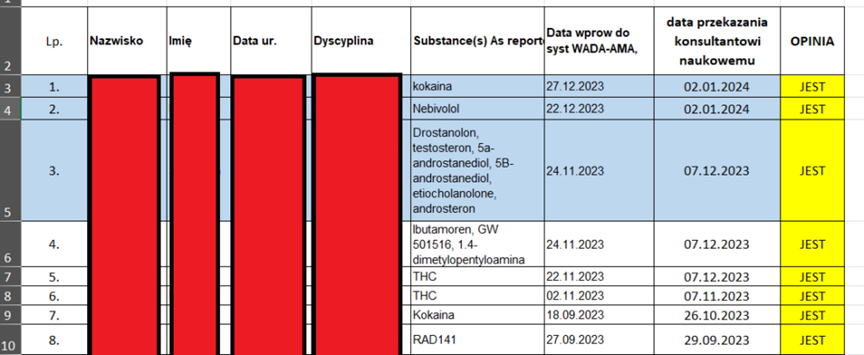Friend
Professional
- Messages
- 2,677
- Reaction score
- 1,095
- Points
- 113
Doping tests of thousands of athletes were publicly available.
Hackers have made more than 50,000 files stolen from the system of the Polish Anti-Doping Agency (POLADA) publicly available. The documents contain personal data of thousands of Polish athletes, including medical records and anti-doping test results.
POLADA claims that the attack was organized by a group that operates with the support of foreign intelligence services. The incident is currently being investigated and a thorough technical analysis is being conducted.
Cybercriminals published 250 GB of data, including passwords, contact information, medical records and doping test results. The documents also included photos of Polish athletes. In addition to the data leak, hackers disabled the POLADA website, which is still unavailable. Responsibility for the attack was claimed by the Beregini group, which said the attack was a response to "turning the Olympic Games into an instrument of political pressure."

Part of a table with published data
The Polish Anti-Doping Agency promptly informed the athletes about the incident by sending them a letter, which was later published by Polish cyclist Wojciech Pszolarski in social networks. In the letter, the agency apologized to the athletes and assured them that the relevant authorities and law enforcement agencies were notified of the incident.
POLADA also confirmed that the leaked documents contain names, home and email addresses, as well as phone numbers of athletes. However, the Polish media claim that there may be more information in the files.
Was there any doping?
Among the stolen data, there is also false information about the allegedly positive results of doping tests of a number of well-known athletes. Among them were such stars as the first racket of the world among women Iga Sventek and the striker of the football club "Barcelona" Robert Lewandowski.

Certificate of passing a doping test
POLADA promptly refuted the false information about doping, emphasizing that none of the information provided was true. None of the athletes mentioned have tested positive for doping, and the dates given in the leak do not coincide with the actual checks carried out by the agency. The International Agency for Ensuring Integrity in Tennis (ITIA) has confirmed to The Athletic that there is no evidence of violations by Iga Sventek in their database.
POLADA also said that cybercriminals use the data obtained to spread misinformation. The agency urged the public not to believe false news that undermines the reputation of Polish athletes.
Igi Schwentek's team supported POLADA's statement, confirming that the information provided is false. Representatives of Robert Lewandowski were also notified about the situation, but no comments from their side have yet been received.
Source
Hackers have made more than 50,000 files stolen from the system of the Polish Anti-Doping Agency (POLADA) publicly available. The documents contain personal data of thousands of Polish athletes, including medical records and anti-doping test results.
POLADA claims that the attack was organized by a group that operates with the support of foreign intelligence services. The incident is currently being investigated and a thorough technical analysis is being conducted.
Cybercriminals published 250 GB of data, including passwords, contact information, medical records and doping test results. The documents also included photos of Polish athletes. In addition to the data leak, hackers disabled the POLADA website, which is still unavailable. Responsibility for the attack was claimed by the Beregini group, which said the attack was a response to "turning the Olympic Games into an instrument of political pressure."

Part of a table with published data
The Polish Anti-Doping Agency promptly informed the athletes about the incident by sending them a letter, which was later published by Polish cyclist Wojciech Pszolarski in social networks. In the letter, the agency apologized to the athletes and assured them that the relevant authorities and law enforcement agencies were notified of the incident.
POLADA also confirmed that the leaked documents contain names, home and email addresses, as well as phone numbers of athletes. However, the Polish media claim that there may be more information in the files.
Was there any doping?
Among the stolen data, there is also false information about the allegedly positive results of doping tests of a number of well-known athletes. Among them were such stars as the first racket of the world among women Iga Sventek and the striker of the football club "Barcelona" Robert Lewandowski.

Certificate of passing a doping test
POLADA promptly refuted the false information about doping, emphasizing that none of the information provided was true. None of the athletes mentioned have tested positive for doping, and the dates given in the leak do not coincide with the actual checks carried out by the agency. The International Agency for Ensuring Integrity in Tennis (ITIA) has confirmed to The Athletic that there is no evidence of violations by Iga Sventek in their database.
POLADA also said that cybercriminals use the data obtained to spread misinformation. The agency urged the public not to believe false news that undermines the reputation of Polish athletes.
Igi Schwentek's team supported POLADA's statement, confirming that the information provided is false. Representatives of Robert Lewandowski were also notified about the situation, but no comments from their side have yet been received.
Source

